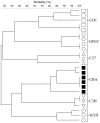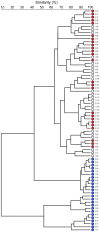Site and strain-specific variation in gut microbiota profiles and metabolism in experimental mice
- PMID: 20052418
- PMCID: PMC2798964
- DOI: 10.1371/journal.pone.0008584
Site and strain-specific variation in gut microbiota profiles and metabolism in experimental mice
Abstract
Background: The gastrointestinal tract microbiota (GTM) of mammals is a complex microbial consortium, the composition and activities of which influences mucosal development, immunity, nutrition and drug metabolism. It remains unclear whether the composition of the dominant GTM is conserved within animals of the same strain and whether stable GTMs are selected for by host-specific factors or dictated by environmental variables.
Methodology/principal findings: The GTM composition of six highly inbred, genetically distinct strains of mouse (C3H, C57, GFEC, CD1, CBA nu/nu and SCID) was profiled using eubacterial -specific PCR-DGGE and quantitative PCR of feces. Animals exhibited strain-specific fecal eubacterial profiles that were highly stable (c. >95% concordance over 26 months for C57). Analyses of mice that had been relocated before and after maturity indicated marked, reproducible changes in fecal consortia and that occurred only in young animals. Implantation of a female BDF1 mouse with genetically distinct (C57 and Agoutie) embryos produced highly similar GTM profiles (c. 95% concordance) between mother and offspring, regardless of offspring strain, which was also reflected in urinary metabolite profiles. Marked institution-specific GTM profiles were apparent in C3H mice raised in two different research institutions.
Conclusion/significance: Strain-specific data were suggestive of genetic determination of the composition and activities of intestinal symbiotic consortia. However, relocation studies and uterine implantation demonstrated the dominance of environmental influences on the GTM. This was manifested in large variations between isogenic adult mice reared in different research institutions.
Conflict of interest statement
Figures






References
-
- van der Waaij D. The digestive tract in immunocompromised patients: importance of maintaining its resistance to colonization, especially in hospital in-patients and those taking antibiotics. Antonie Van Leeuwenhoek. 1984;50:745–761. - PubMed
-
- Kelly D, King T, Aminov R. Importance of microbial colonization of the gut in early life to the development of immunity. Mutat Res. 2007;622:58–69. - PubMed
-
- Cash H, Hooper LV. Commensal Bacteria Shape Intestinal Immune System Development. ASM News. 2005;71:77–83.
-
- Kelly D, Campbell JI, King TP, Grant G, Jansson EA, et al. Commensal anaerobic gut bacteria attenuate inflammation by regulating nuclear-cytoplasmic shuttling of PPAR-gamma and RelA. Nat Immunol. 2004;5:104–112. - PubMed
-
- Nicholson JK, Holmes E, Wilson ID. Gut microorganisms, mammalian metabolism and personalized health care. Nat Rev Microbiol. 2005;3:431–438. - PubMed
Publication types
MeSH terms
Grants and funding
LinkOut - more resources
Full Text Sources
Other Literature Sources
Molecular Biology Databases
Research Materials

